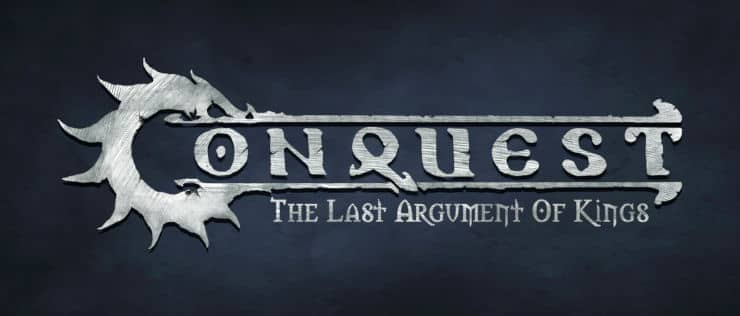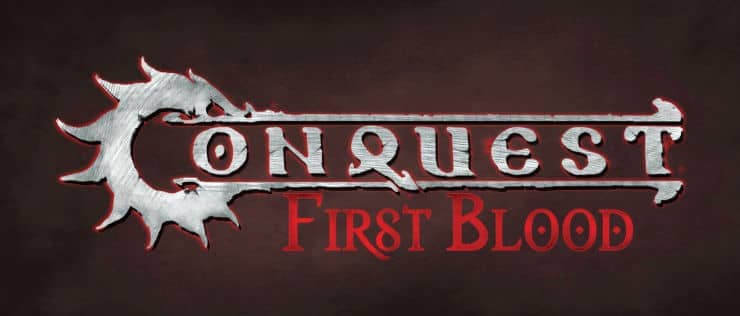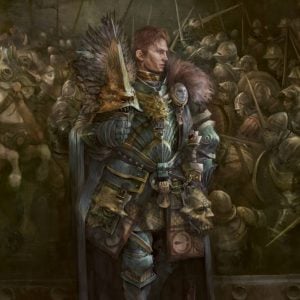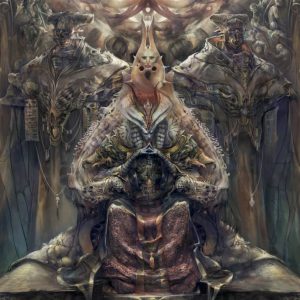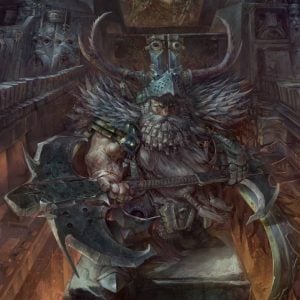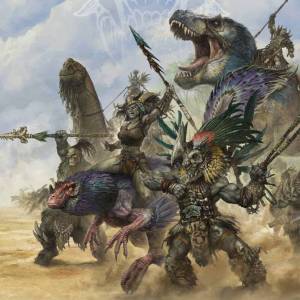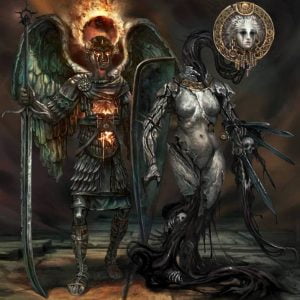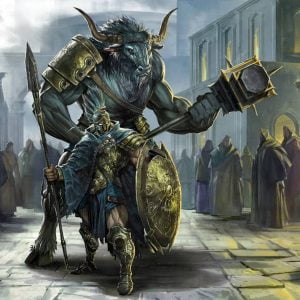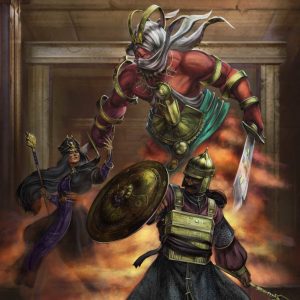
Haunted by the ghosts of his past life, the Warlord stood amidst the covered ruins of a city, somewhere in the Dominion’s old province of Galtonnia. Unsure of purpose for himself and his army, his military mind focused on exploring the old province, both to get the lay of the land but also to search for abandoned mausoleums that could provide new troops.
As memories of his life before his Anointment kept besieging his mind, tasks and objectives that would otherwise be simple were constantly second guessed. Realizing that both himself and his army had no need for the considerations of the living – such as provisions, fresh water or even rest – the Warlord struggled to adopt a firm mindset about his methods. Ultimately, and ironically adopting advice given to him in his previous life, he decided a slow and steady approach was favorable, as he learned to capitalize on the advantages he and his army held over the living. His first order of business, he decided, would be to excavate the ruins of the city around him. He would then use the old city, Divina, as his own base of operations, not only to serve as headquarters for his Legions but also to establish a seat of power against the other Anointed.
Despite the obvious advantages against the living, however, the Warlord was soon confronted with the obstacles that the troops had to overcome, fueled not by true will but the will of their betters and their own instinctual urges, offered by memories from their old lives. To locate those among them with more presence of mind, he assigned other officers to oversee operations, while he in turn oversaw the performance and capacity of his officers. One stood out from among them, Xhiliarch Iulios, who portrayed near full character and free will. Craving intelligent conversation, he invited the officer to walk and oversee the works in person.
It was during that walk and sparked by his conversations with the Xhiliarch that the Warlord realized just how much hatred he nurtured for the petty, insignificant wants and needs of the man he once had been – and partly was still. With the troops around him mirroring the hatred he himself felt for his own individuality, the Warlord felt a surge of power from that hatred. Channeling that might to his troops, he allowed them to tap into their own memories, a skill that would come useful in large combat situations.
It was at that time that the barbarians of the Wastelands launched their attack.
The Battle of Divina Ruins proved to the Warlord just how inefficient his troops could be. His own presence on the field and their near instant response to the surprise attack of the W’adrhŭn assured a victory – the barbarians did not manage to disrupt his operations to any significant degree and his losses were minimal. However, they managed to escape, likely having observed his operations near the crypts his troops were trying to unearth – thus able to report back about his purpose and objectives in the area.
The only appropriate response for the Warlord would be to mobilize more troops from Capitas – with eyes set on the barbarian wasteland and the lands of the living beyond them.
He opened the map, putting his dagger as a weight on one side and a stone on the other. It was an aged and tattered thing that belonged to a bygone era, but it was the best he had managed to find; it would have to do. He leaned over it, dead eyes scanning names and landmarks they had scanned time and time again.
It was not easy, deciphering its mysteries. The map presumed much, including its scale, and the Fall had left little beyond mountains to identify. But his biggest problem at the time was the noise, the constant buzzing of a war camp outside. The distant clangs of weapons from the training, the occasional thunder of armored steps in cadence from patrols and sentries changing guard and the voices of more than five thousand men, talking, laughing, singing… Once, perhaps, he had loved these sounds, he realized, but now he found them annoying, infuriating, hateful even. Rather than the comfort of camaraderie and order, they felt like an invader, a ghost that haunted his every move. Like a thorn in his mind, they would hurl his thoughts into a whirlwind of confusion.
He voiced a guttural, almost otherworldly growl and banged his hand on the table. Distant memories withdrew reluctantly and the sounds in his mind begun to fade until his true circumstances became evident once more. No laughs. No voices. No training. Naught but the wind whispered outside. His Legion was standing and waiting and would do so until he ordered them to move.
Equally annoyed with the companionship of silence as he was with the memories of sound, he shook his head and returned to the task at hand. So far, the Herm Mountains to the North and the two legs of their mountain range was all he had for reference but he had no way of knowing the scale of the map or its accuracy. Today, however, he had found something: ruins of a walled city which he assumed had once been Divina. This gave him at least his location on the map; from there, and with the landmarks of the mountains as guides, he could perhaps begin to calculate the scale and distances.
Knowing the lay of the land was important for his enemies and thus would allow him to predict their movements and manipulate their positions. Besides, if he was to be honest, he would be blind once he had left the province of Galtonnia. He himself had reconquered these blessed lands from their settlers a few centuries ago and since then Xhiliarchs aplenty had led patrols and expeditions, keeping the heathen things and their beasts at bay. This time, however, he was not here out of some erratic reaction to the presence of others. He was about to start a war. He needed proper, updated maps. He needed information about his enemy’s positions; Fall, he needed information about his own positions! Above all, however, he needed sword-arms. He needed to move carefully, scout and secure Galtonnia piece by piece, locate lost and unopened mausoleums and tombs and raise the faithful to serve their god once more.
Once again, he voiced a guttural, almost otherworldly growl and banged his hand on the table. Was this his memories plaguing him again? There was no need for all this nonsense. It was time. Let the Prophet and the Seer and the Howler and all the other demented, scheming fools play their games of numbers. His was the war to wage. He had no supply lines to consider, no reason to seek shelter for rests, no necessity for water sources on the road. He had a single Legion with him; a Legion that did not rest, did not sleep, did not tire. More than enough to cull the roaming tribes and even begin a siege against the W’adrhŭn Oasis, to the Northwest. Before long, two more Legions would join and more were being prepared all over his Lord’s Dominion. Assuming the rest of the Anointed performed their tasks, he had no need to wait.
Choice
Scout the area and secure the old province of Galtonnia.
Time held little dominion over the dead.
He found it surprising that this still surprised him; the truth was, however, that even when he tried to think of how much time he had already spent in his current condition, he could not answer. Decades, certainly. Possibly centuries; but no more than two or three, surely. Part of him, the part plagued by memories of the living, raged like a bull inside his head at this uncertainty, but in the end the Warlord cared little. The slices of time matter less in eternity. This had made his choice easy. In regards to the grand scheme of things, he had all the time he needed to secure his footing, expand the direct influence of the Dominion over the old province and hopefully uncover more troops.
During an expedition, however, things were not that simple and he had to rely on his memories to understand and appreciate time. His Legionnaires did not tire and did not sleep. Therefore, in a way, time would always be on his side, compared to the armies of the living. By extension, success and the completion of his objectives would have less to do with time pressing him and more to do with strategy, numbers and logistics in order to capitalize on this advantage. But if his strategic mind was still being surprised by this perspective, he needed to change that, lest he lose an advantage. So, like any good soldier and commander, he decided to train. Securing Galtonnia would be his first drill.
When it came to manual labor, for instance – like the excavation of the ruined city he was standing on – such advantages could be calculated in two ways, time or numbers. A living general would have to rotate his workforce, assigning two or three centuries to the same area, if he wanted them to work around the clock, or spread the same numbers to multiple areas but at the cost of time. Rotations were unnecessary in his case. In theory, he could put the entire legion to work and have the city excavated enough for mausoleums and cemeteries to be discovered within a week, maybe two. Or, he could maintain the same timeframe as a living commander would but with only one third, if not less, of the forces engaged, thus leaving the rest to perform other tasks.
The same principal could be applied to his other objective; scouting the land and updating his maps. The entire legion could be assigned to the task, split in cohorts and marching in all directions, just to return within the week with all the information he needed. It would be a crude work but it would offer insights he sorely lacked, like the latest positions of the W’adrhŭn. It also, however, run the risk of tipping them off. He knew that they must have encountered lost patrols before but it would only take a cadet to realize these groups were different and those savages had more warriors than they did farmers.
The complication here, he knew, was focus and the limitations presented by the number of officers. Much like a living general would have to face insubordination and morale, he had noticed, long before this expedition, the moment his troops were brought far from Capitas and the Pyre, or the further their objective lied from his own focus, the more prone they became to erratic behaviors. Generally, his officers showed much reduced effects on that front, this however was not so much a rule, or if it were, then other Anointed obviously understood it better. As far as he was concerned, in some cases, reduced numbers seemed to allow for individuals to increase their focus and capacities. In others, individual will degenerated. As a rule, however, at least one centurion should be present in each separate group, to limit the risk of “insubordination.” In theory, he believed he could use cultists too but he deemed them unreliable and prone to fancies that deviated from his mission. In living terms, their loyalty and discipline were both suspect.
Choice
Concentrate on the excavation.
“A small step carries you further, son.”
The voice echoed distantly at first, until it exploded in his mind, like a thunder that rolled through centuries before it finally boomed and roared and growled in the sky above.
“Easy now… You’ll ride Ruthless soon enough, when you’re tall enough to manage her.” He heard the voice clearly now, as clear as a ten-year-old would. “Remember: a large step brings you fast.” He muttered the next first words along with the ten-year-old, who was repeating his father’s much-repeated lesson; “A small step carries you further, son.” He smiled, his dry lips cracking by the unfamiliar movement – without pain, but a momentary unpleasant reminder nonetheless, which violently shook him back into the present.
A small step. Finish the job here, move on to the next task. Time, as ever, was not an issue, so he could experiment with different task-force compositions, weave out the least effective ones, spot his most competent and effective officers and figure out the best way to utilize them in combat. The question now, he mused, was what their goal should be. He had no doubt he would soon identify the city ruins with certainty – and his suspicions that they were standing on the ruins of Divinus would be confirmed. But if he planned on concentrating his attention on the excavation, he should squeeze more out of it.
The immediate approach was, perhaps, the best. Locate cemeteries and mausoleums, exhume candidates, allow for the Cult to begin the recruitment process. As a general, he knew that this was to the immediate benefit of his campaign. As an Anointed, however…
He forced a sigh. This part of his existence he did not find to his liking or his nature. But it was what it was. The Anointed played games he did not care for or excel at. But perhaps having his own territory, a city he could call his own base of operations, his own dominion, could safeguard his rear, both in the war effort and from the other Anointed. The downside, of course, would be the potential of attracting too much attention from his peers. So far, he had been content to stay in camps with his Legions. To suddenly show interest in his own city would be interpreted differently by some of the other Anointed.
Choice
Establish dominion.
“Stand on firm ground before taking the leap.”
He shook his head with a grunt, refusing to let the constant barrage of memories plague his focus and purpose. That boy dreaming of knights had died, as had the boy’s father. He was the Warlord. And Divinus would be his domain. But in order for it to be so, he needed to focus.
He discovered early on during the excavations that a good part of his troops had difficulty with precision tasks without proper supervision. By and large, this was not a concern for this objective. With the exception of perhaps damaging excavated bodies, it wasn’t archeology he was interested in, it was…
“Why do we keep these relics, Mentor?”
“Because humanity’s past shall ever plague its future. We are the custodians of that past, the wardens of that future.”
The memory of his mentor’s voice gave him pause and, for a moment, the hungering light of his eyes was sated by fondness. Once that moment was gone, however, his eyes frowned, fanning the flames of his anger once more. He had had enough of this… this curse of memories. He was the Warlord and he would do as he pleased. The man he had once been was dead, dead, dead!
He let out another aggravated, guttural growl, before forcing his thoughts to focus on the task at hand once more. Allowing his troops to act independently, based solely on his orders and the command of their superiors would perhaps damage some findings. It would, however, offer him greater insight at their limitations and the quality of each officer, knowing who to use for what task in the future and – more importantly – who he could entrust with command in combat.
On the other hand, he knew his own focus helped any front. If he took personal command of the excavation, if he honed his focus, turned it on the tasks at hand, the project would probably be over faster and more efficiently. This, he knew, would not be without risks. Knowing the limits of your troops and officers was necessary to any commander. But at the end of the day, delegating was a thing the living did. He did not have to.
Choice
Delegate – The Warlord will gain insight into his own troops operational capacity. The excavation of Divinus will be slower and some findings might be damaged. This might influence future options.
“Xhiliarch Iulios, Warlord. At your service.”
He felt confused, dizzy almost, wavering between memories and present. It had been months before he had properly exchanged words with another. Save for the other Anointed – and the incessant gabbling some of them reveled in – the old saying about the dead telling no tales had proven all too true. The only voices he had been hearing had been echoes of the past or, at best, reports, delivered flatly, soullessly even. Iulios demeanor, however, promised something different, something more intelligent. Ironically, something more alive.
“Have a seat, Xhiliarch,” he said, forcing his mind to remain in the present and ignoring the siege of memories that would have him offer the officer a drink. Iulios complied, instinctively muttering a thank you, and the Warlord took a seat behind his desk. Silence fell once more, as the Xhiliarch eyed the Anointed, waiting to be addressed. The Warlord did not force him to wait long. Glancing at the written reports before him – he had insisted on receiving those – he raised his eyes only moments after picking up one.
“Your reports are well worded, Xhiliarch,” he said in the end, his dry skin tingling by the sensation the casual tone of the conversation offered. “Concise but descriptive, much more so than those of your peers. And your progress has been rather faster compared to others as well.”
“Faster than I feared, Warlord,” the officer replied. “Perhaps not as fast as I had hoped.”
“Do you understand why you are here?”
“To serve Him, Warlord.”
The Warlord’s lips cracked as he smirked, amused.
“Quite so. But I was being more specific. Do you suspect why you were summoned before me?”
There was a brief pause before the Xhiliarch answered. To anyone else, this would mean nothing. To a servant of the Old Dominion, it meant everything and in that brief moment, the Warlord knew all he needed to know from the man before him: the man had hesitated.
“I suspect, Warlord,” the Xhiliarch said passively in the end, “that you wish to discuss my mental capacities.”
“Almost, Xhiliarch,” the Anointed replied. “I want you to find those with a similar demeanor to yours. Are you aware of such others?”
“I am,” Iulios said. “Many officers. Quite a few legionnaires, I suspect, spread around the cohorts.”
“Legionnaires?” he asked surprised.
“Yes, Warlord.” Iulios nodded. “Most seem to need the guidance you or the other officers offer. Some show… independence. Initiative, even. Some more than some officers.”
“Good.”
Choice
Observe them and report – Xhiliarch Iulios will be assigned to understanding the dynamics of the Legion’s awareness.
“I don’t need anything drastic, Xhiliarch,” he said, reveling in the nonchalant way he uttered the words. “You are to observe and report. I want to know the numbers, capacity and stations of all those you deem noteworthy in their… how did you put it? Mental capacities.”
The Xhiliarch nodded. “As you command, Warlord,” he said, obviously unsettled by the fact he was sitting and was not saluting or standing attention while uttering the words. He then shifted a little more in his seat and the Warlord nodded.
“Speak freely, Xhiliarch,” he said.
“Sir,” Iulios said after a moment’s thought, “if I may ask. Why? I have a feeling this is about more than just mental capacities.
“That is precisely why, Xhiliarch,” he answered. “Because you have a feeling. War is not all about numbers, equipment and tactics.” He got up, turned his back to his officer and locked his hands behind his back, used, by now, to the rattling noise of his joins as he did so. “War and combat need instinct,” he said in the end. “Drilling and discipline are meant to eliminate that need, to force mechanical responses to situations one has encountered countless times before. But in the heat of battle, when the battlefield has descended into chaos, an officer, a soldier, needs instinct. That was true in our past lives. It is true still, I am sure.
“The effects of concentrated numbers on the performance of troops have been recorded during the Anointed Wars,” he said turning to face the Xhiliarch once more. Lord, it felt good to have a conversation again, he thought, before reining his own thoughts in once more. “But our condition, our capabilities and our limitations are different from those that forged our memories. More than that, our enemies will not utilize the same cold application of tactics that we can apply. We need to adapt our responses on the field from what we once knew, or rather, we need to alter the application of our memories. Drilling, so far, has not helped as much as I had hoped. I need you to locate individuals that can instinctually react to these things, that have the intuition to adapt as the need arises.”
The Xhiliarch nodded in understanding. “It will take some time, Sir.”
“Time, Xhiliarch, is for the living,” he said. “We must measure our existence by tasks in His name. Now,
Choice
Walk with me– I want to inspect the works.
It did not take too long to regret his decision.
At first, he had enjoyed the conversation immensely; flashes of his previous life besieged his mind, as he and the Xhiliarch walked among the men, inspecting the work and commenting on the findings, and the present and past mingled in his vision now and then. But this, he had come to learn to ignore with time; and he had had plenty of that. It was… unsettling, infuriating at times, but the conversation, the very existence of someone he could talk with, was distraction enough for him to enjoy the process. Until he realized how their talk disturbed the quiet. Until he realized how many of his soldiers threw glances at him when they thought he was not looking. Until he could feel their envy in his heart as if it was his. And, finally, until he realized how the envy was hatred and how that hatred was his.
He stopped moving and talking and the Xhiliarch followed suit, surprised by his own actions. Then, little by little, the noise of the excavation began fading, as more and more soldiers put their tools down, stood up, turned towards him and stood still.
Silence fell, save for the soft whispers of a breeze and the odd sounds of tattered banners, rotten tents and wizened plumes dancing with it. And in its middle was he, the Warlord, filled with disgust for one thing and one thing alone; his own living memories.
He hated them. Not because of the man he had been then, not because of the cause he had had or the dreams or anything specific really. He did not hate his memories because he envied the man who had lived them, because he missed that life or because he was its antithesis. He hated his memories because of how mundanely insignificant they were, how futile, how… confined, self-centered and narrow-minded. He stood there bathing in that hatred, fueled by it, feeling whole because of it and, ironically, more alive than he ever had felt when his heart was beating. And in that feeling, he sensed the Power of his Lord and was bathed in His bliss.
He reveled in that feeling for some time, the rest of his warriors touching at it distantly. Then, just as suddenly as he had stopped, he turned, and movement returned to the Camp. Once more his lips cracked as he smiled and whispered to his troops.
Choice
“Remember” – The Warlord shared his hatred with his troops – He will learn how to kindle more Memories of Old, a boost for future mass combats as an army.
The Battle of Divina’s Ruins
And so it was that Predator Zenduali of the Manucode launched a surprise attack on the Warlord’s camp at the ruins of Divina. Her goal: investigate up close the excavation site, monitor the reactions and fighting abilities of the dead ones and disrupt their operation as much as possible. Or so she thought; Raptor growls and war chants filled the night, a stark contrast to the deathly silent, composed response of the Warlord’s army. But their silence was not one of shock or fear. Guided by the will of their Warlord and fueled by the newly awakened memories of their past lives, their reaction was near-instant and precise. Still, not all was lost from the beginning for the W’adrhŭn. Equipped for excavation work, rather than combat, most of the Warlord’s army had to arm themselves; and in that narrow and rapidly closing window of time, Zenduali’s raptor rider’s charged to their objective, while her hunters and warriors kept a path clear for their escape.
The reports from the survivors were clear:
Choice
Old Dominion Victory

